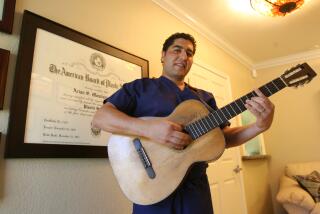Public Health Officer Warns of Risks of Liposuction
- Share via
Orange County’s public health director has warned patients about the risks of liposuction and questioned whether state regulation is adequate, following reports that at least 34 patients were infected last year.
“We see a lot of liposuction being done by doctors of many specialties--dermatologists, obstetricians, plastic surgeons, OB-GYNs,” said Dr. Hugh Stallworth. “You could study and take a course and buy the equipment and just do it. There is no one who can say you can or cannot do this procedure unless you are working in a hospital.”
Stallworth cautioned that while many doctors and patients consider liposuction “a fairly easy if not innocuous procedure,” it is “not innocuous and this concerns me. You are breaking the skin and injecting fluid. We have seen that infection can be introduced. It can be a problem.”
Stallworth’s agency reported last week that about three dozen liposuction patients contracted an unusual and serious infection after being treated by an Orange County doctor who allegedly reused disposable medical tubes and improperly sterilized other surgical tools. The physician has not been disciplined.
The Medical Board of California, which licenses doctors, will decide within the next year whether to recommend changes in how liposuction and other cosmetic surgery is regulated in California, board President Tom Joas said.
The board began its investigation into how the specialty was being practiced after the deaths last year of two liposuction patients, one in Los Angeles and the other in Orange County.
Joas said the recommendations probably would include a moratorium on “large-volume liposuction” and more stringent criteria for who may do the procedure.
The need for the changes is partly derived from the public clamor for liposuction and partly from its attractiveness to doctors.
“This is the last bastion of free enterprise within medicine,” said Joas, an anesthesiologist who works with cosmetic surgeons. “It is outpatient and prepaid. It is not covered by HMOs,” and there is no hospital supervision.
Medical board officials expect any recommendations would have to go to the Legislature, because the board lacks the regulatory authority to do what is needed, said board research manager Janie Cordray.
Board investigators are compiling basic data about cosmetic surgery and liposuction statewide. The board lacks information about how many procedures are performed, who is doing them and where and the number of cases with complications, according to a July report by the board’s Plastic/Cosmetic Surgery Committee.
Another problem is that any proposal to limit or regulate who can do these procedures is sure to be fought, several physicians said.
“The problem is [the board is] falling into a political trap,” said Dr. Jeffrey Alan Klein of San Juan Capistrano, the dermatologist who created the popular tumescent liposuction technique, which allows removal of fat with minimal blood loss and use of a local anesthetic. “They are taking so long because they are trying to come up with a plan that will not infuriate everybody.”
The July report calls for requiring that all physicians doing elective outpatient surgery have malpractice insurance and that coroners and insurers report deaths associated with cosmetic surgery to the medical board.
Klein, Joas and several others said it is impossible to reform the current system without data on deaths resulting from liposuction and other outpatient surgery. Coroners and others may record a death following cosmetic surgery as resulting from cardiac arrest, for instance, which is misleading, he said.
“There has to be 100% reporting and no fudging,” Klein said. “The death certificate has to say that this patient had an outpatient surgical procedure in the last 30 days. Those patients shouldn’t be dying.”
Some lawyers involved in cosmetic surgery malpractice cases accuse the medical board of not adequately regulating plastic surgery and of meting lax punishment for negligent doctors.
“It doesn’t look like we can count on the state medical board to look out for consumers,” said Laguna Hills malpractice lawyer Craig Walkon. “That is a sad comment, because isn’t that their reason for existence?”
Walkon represents more than a dozen men and women who have sued Dr. Gerald Greenberg of Laguna Niguel in connection with infections they allegedly contracted in his office during liposuction.
Last year in Orange County, a La Habra woman died after 10 1/2 hours of plastic surgery, including large-volume liposuction. The doctor, Earl W. Matory Jr., and the anesthesiologist, William Hoo, were stripped of their medical licenses.
Joas said the current system requires vigilance by patients. “It is buyer be informed,” he said.






